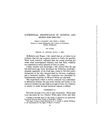 19 citations,
January 2019 in “International Journal of Trichology”
19 citations,
January 2019 in “International Journal of Trichology” Indian dermatologists recommend treating common hair loss with a balanced diet, stress reduction, mild shampoos, and sometimes minoxidil and supplements.
 14 citations,
June 2016 in “Pediatric Dermatology”
14 citations,
June 2016 in “Pediatric Dermatology” Some congenital hair disorders improve with age and can be managed with treatments like minoxidil, retinoids, supplements, and gentle hair care, but there's no cure.
9 citations,
October 1946 in “Experimental biology and medicine” Rats fed soybean oil meal lost hair, but adding inositol, biotin, cystine, or methionine to their diet prevented this and improved growth.
 6 citations,
January 2011 in “Springer eBooks”
6 citations,
January 2011 in “Springer eBooks” Nutrition is important for skin health, and changing diet can help prevent and treat skin diseases.
 2 citations,
June 2023 in “Journal of the American Academy of Dermatology”
2 citations,
June 2023 in “Journal of the American Academy of Dermatology” Hair, skin, and nails supplement use nearly doubled from 2011 to 2020, with higher usage among young adults, females, and certain ethnic groups.
 September 2024 in “Journal of the American Academy of Dermatology”
September 2024 in “Journal of the American Academy of Dermatology” Dietary changes and supplements mostly did not improve alopecia areata.
 March 2014 in “CRC Press eBooks”
March 2014 in “CRC Press eBooks” Some nutrients and antioxidants may improve skin and hair health, but more research is needed to confirm these benefits.
 239 citations,
July 2002 in “Clinical and Experimental Dermatology”
239 citations,
July 2002 in “Clinical and Experimental Dermatology” Low iron and L-lysine levels can cause hair loss in women, and increasing these nutrients can reduce hair shedding.
 11 citations,
May 2009 in “Actas Dermo-Sifiliográficas”
11 citations,
May 2009 in “Actas Dermo-Sifiliográficas” Some treatments can help hair regrowth in alopecia areata, but none offer a cure, and effectiveness varies.
 November 2024 in “Skin Appendage Disorders”
November 2024 in “Skin Appendage Disorders” Misinformation about alopecia can lead to poor treatment, so it's important for healthcare professionals to correct myths.
 January 2024 in “Biomedical journal of scientific & technical research”
January 2024 in “Biomedical journal of scientific & technical research” Vitamins A, B7, C, D, and E are essential for healthy hair growth and preventing damage.
 9 citations,
September 2018 in “Clinical, Cosmetic and Investigational Dermatology”
9 citations,
September 2018 in “Clinical, Cosmetic and Investigational Dermatology” One supplement improved hair loss and quality faster and more effectively than the other in treating telogen effluvium.
 27 citations,
July 1946 in “The journal of nutrition/The Journal of nutrition”
27 citations,
July 1946 in “The journal of nutrition/The Journal of nutrition” Biotin and inositol are crucial for pig health and growth.
 10 citations,
October 2017 in “Pediatric neurology”
10 citations,
October 2017 in “Pediatric neurology” Biotin and acetazolamide improved hair and nail growth, mental function, and reduced headaches in a child with autism.
 3 citations,
January 2017 in “Journal of cosmetology & trichology”
3 citations,
January 2017 in “Journal of cosmetology & trichology” The food supplement with L-cystine, Serenoa repens extract, and biotin safely reduced hair loss and improved hair growth in men and women.
 1 citations,
January 2018 in “Journal of cosmetology & trichology”
1 citations,
January 2018 in “Journal of cosmetology & trichology” Hair loss lotion with specific ingredients effectively improves hair growth and thickness safely.
 September 2022 in “Farmacja Polska”
September 2022 in “Farmacja Polska” Biotin is important for health, but taking extra usually doesn't help unless you're deficient.
 January 2018 in “International journal of food and nutrition research”
January 2018 in “International journal of food and nutrition research” Intermittent iron and nutritional supplements can help reduce hair loss.
 1 citations,
August 2004 in “Alternative & complementary therapies”
1 citations,
August 2004 in “Alternative & complementary therapies” Non-drug methods like diet, supplements, and aromatherapy can help manage hair loss and its emotional impact.
 24 citations,
June 2010 in “Clinics in Dermatology”
24 citations,
June 2010 in “Clinics in Dermatology” Taking too many vitamin and mineral supplements can cause serious health problems.
Instagram ads for skin, hair, and nail supplements often make broad health claims without clear ingredient information, and are not FDA-regulated.
 98 citations,
October 2012 in “Dermatologic Clinics”
98 citations,
October 2012 in “Dermatologic Clinics” Eating the right nutrients can improve hair health, but taking extra supplements usually doesn't help unless you have a deficiency.
 65 citations,
January 2009 in “Annals of Dermatology”
65 citations,
January 2009 in “Annals of Dermatology” Zinc supplements increased zinc levels in some hair loss patients but didn't significantly improve hair growth.
53 citations,
March 2003 in “Journal of Investigative Dermatology” Human skin cells have a high-affinity system for biotin transport, crucial for skin health.
 3 citations,
May 2018 in “Journal of nutritional health & food science”
3 citations,
May 2018 in “Journal of nutritional health & food science” Nutritional supplements can help manage hair loss and promote hair growth by strengthening hair roots and countering harmful effects of pollution, smoking, and deficiencies in vitamins and minerals.
 1 citations,
January 2015 in “Hair therapy & transplantation”
1 citations,
January 2015 in “Hair therapy & transplantation” Some supplements and hormones can increase hair loss by raising DHT levels.
Taking supplements after sleeve gastrectomy surgery can reduce hair loss by addressing nutritional deficiencies.
 8 citations,
January 2020 in “Skin appendage disorders”
8 citations,
January 2020 in “Skin appendage disorders” Saw palmetto supplements may modestly improve hair regrowth with few side effects, but more research is needed.
 3 citations,
November 2020 in “Curēus”
3 citations,
November 2020 in “Curēus” A child's hair loss from alopecia areata was fully reversed in five months using diet and supplements.
 8 citations,
September 2021 in “Journal of Cosmetic Dermatology”
8 citations,
September 2021 in “Journal of Cosmetic Dermatology” Some diets and supplements might help with skin disorders, but their effectiveness varies and more research is needed.


























